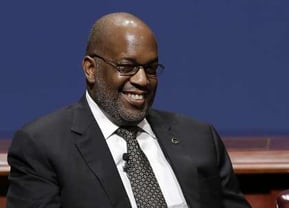The Power of Gratitude
During this season of giving thanks, we dedicate this month’s themed article to Bernard J Tyson, CEO Kaiser Permanente, who brought a new perspective to healthcare - one that supports a holistic approach to human wellness. His sudden passing was a shock to the industry and especially those who had the good fortune of working with him. Our Advisory Board Chair, Bob Sachs, sums up Bernard’s impact below:
"Bernard's professional career started at KP in front line leadership and moved through many roles there before becoming CEO. He was a great example of an authentic leader. His engaging style and focus on doing the right thing, no matter how difficult, developed and scaled as he moved into positions of increasing responsibility and complexity. Bernard focused on quality, affordability, accessibility, and health equity and he was a tireless advocate for diversity, inclusion and racial justice. Consistent with these priorities he increasingly directed his efforts, and KP's programs and resources, to address the social determinants of health by working across the entire health ecosystem. Bernard's leadership helped shape the future of health care and health in the US and beyond. He will be missed by those who knew him, his organization and beyond."
Now is the time to pause, reflect, and acknowledge all that we have to be thankful for and uncover the meaning of gratitude and its impact on personal and professional growth. Gratitude means thankfulness, counting your blessings, noticing simple pleasures, and acknowledging what is received. Gratitude shifts your focus from what you lack to the abundance of what is already present. Giving thanks makes people happier and more resilient, it strengthens relationships, it improves health, and it reduces stress.
There is a science to gratitude. At the individual level, gratitude triggers humility.1 While we often get wrapped up in our own lives, the practice of gratitude allows us to stop and think about how the actions of others creates positive impact. Fostering an attitude of gratitude allows us to acknowledge others who have played an important role in supporting our goals. Gratitude also builds connections and increases positive social behavior.1 2 And, perhaps most important to business leaders, gratitude is linked to bottom-line business outcomes. A little recognition goes a long way. Gratitude in organizations increases trust, commitment, and satisfaction.4 Undeniably, when employees feel that their hard work is recognized and appreciated, they are more likely to go the extra mile. Receiving expressions of gratitude also increases worker productivity by promoting self-esteem and perceptions of self-efficacy.2 When teammates take a moment to express their appreciation for the efforts of others, there is a greater sense of group cohesion which ultimately drives performance.3How to Foster Gratitude
Fostering gratitude is a matter of mindset. Below are a few simple practices to help cultivate gratitude both within oneself and within the culture of the organization:
- Keep a daily gratitude journal.
Take note of the contributions people have made in your life, no matter how small the gesture. - Give specific, meaningful, and heartfelt praise.3
To those people who have excelled beyond the call of duty, make sure to let them know what an excellent job they are doing. They may not even realize how significant a difference their actions have made. Praising good work motivates high levels of performance. - Personalize your appreciation to your employees.
Whether it is a shout-out at a staff meeting or telling the person directly, the effort you put into showing your appreciation demonstrates that others’ contributions are meaningful.
Gratitude is more than just saying “thank you” – it is a mindset and way of being.
Each holiday season, we give thanks by contributing to a non-profit organization that is “redefining or significantly impacting advancement across the health ecosystem” . This year, our donation will be made to the Bernard J Tyson Fund in honor of Bernard’s life and contribution to the healthcare industry. If you would like to learn more, please click here: online.
 |
“The diversity agenda for me is understanding the power of nuances. I am not like you. I am different. My life experience is different. And guess what? As a result of that, I have something to offer. So I’d rather have 12 different people sitting at the table with me, all with different worldviews—all clear that we’re going to solve a common problem. And once we decide how we’re going to go forward, we go forward as a team.” - Bernard J. Tyson |
References
1 Wilson, Y.I. (2014, November). Ways in Which Gratitude Can Transform Your Leadership and Influence. Empowerment Moments Blog. Retrieved from http://empowermentmomentsblog.com/2014/11/23/ways-in-which-gratitude-can-transform-your-leadership-and-influence/
2 Amin, A. The 31 Benefits of Gratitude You Didn’t Know About: How Gratitude Can Change Your Life. Happier Human. Retrieved from http://happierhuman.com/benefits-of-gratitude/#Career
3 Riordan, C.M. (2013, April). Foster a Culture of Gratitude. Harvard Business Review. Retrieved from https://hbr.org/2013/04/foster-a-culture-of-gratitude
4 McQuaid, M. (2015, May). Why Positive Leaders Invest in Gratitude & Forgiveness. Huffington Post. Retrieved from http://www.huffingtonpost.com/michelle-mcquaid/why-positive-leaders-inve_b_7426742.html



